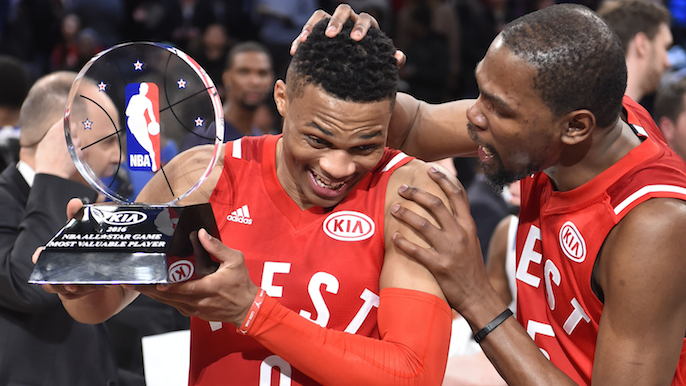The NBA All-Star reserves were announced this evening, to the usual hue and cry of “SNUB!” and “WHAT ABOUT MIKE CONLEY?!?!” I’m not here to judge the rosters – undoubtedly the hue-ers and cry-ers have points to make, and even if I had counterpoints I’m not sure they would be worth anybody’s time.
Instead, let’s talk about what in the hell the NBA is trying to do with their All-Star game and the associated voting in the first place.
The NBA, like the MLB before it, has found itself in a strange place with its All-Star festivities — here we have a fundamentally meaningless exhibition game, meaningless enough that people complain about its competitiveness every year. Meaningless enough that the postgame discussion is usually more about whether the game was worth watching at all than any particular thing that happened.
In a surprisingly off-base move for a league that usually has pretty decent self-awareness, the NBA made a change this year — a change that seems to pretty clearly be an attempt at adding legitimacy to the aforementioned meaningless exhibition game. Specifically, they changed the voting process, adding media and player votes to the starting lineup equation that was once nothing more than a fanbase popularity contest.
I suppose I should start by thanking the league; at least they didn’t tie home court advantage for the NBA Finals to the results of a mid-season exhibition. On the other hand, any attempt at manufacturing legitimacy for an All-Star event is wildly misplaced.
What is an All-Star game, really? It’s a chance for the fans of a sport to see their FAVORITE stars on one court/field/gridiron. Not a chance to see the actual potential of a team filled with stars, but to watch them have fun and to enjoy their CASUAL greatness.
I’ve always enjoyed watching the NBA All-Star game, because once a year I am ready to watch my favorite athletes goof around and toss alley-oops to each other… and if it should so happen to be reasonably competitive in the fourth quarter, maybe one or two guys will play a little defense. It’s an essentially worthless and completely meaningless good time for a die-hard sports fan.
Here’s the problem, and I understand it — in their unending effort to scrape in as many extra dollars as possible, agents and players embraced the concept of contract incentives at some point in the last 10-15 years. And in a blind desire to squeeze that extra star in under the salary cap, general managers agreed that “All-Star appearance” was a reasonable incentive.
Any league that saw this happen found itself in an interesting all-star quandary. Suddenly, guys cared (more than they otherwise should or would have) about getting a spot in this meaningless exhibition. At once, a “snub” became a thing that was far greater than a shot to the self esteem — it became a direct hit to the wallet, which we know is the most valued appendage of most professional athletes.
[A less cynical view of this change would be a look through the prism of post-career discussion and Hall of Fame candidacy — the moment we say “oh, but he’s a 6-time all-star” in a Hall of Fame argument, we naturally imbue All-Star selections with more weight than they deserve. But come on, this is really about money.]
I can sympathize with the conundrum. Truly, I can. But I can’t understand the approach to a fix.
You saw what happened when Major League Baseball tried to artificially inject meaning where it doesn’t belong. Nobody likes it. It’s moving the ball down the field, so to speak, but it’s moving it in the wrong direction.
When the NBA found itself caught between a meaningless exhibition and contract accountability, they should have retreated back towards meaningless exhibition. The solution to the growing importance of having “All-Star” on a resumé is to nip that growth in the bud. The right answer is to say, “No. This is a meaningless exhibition for the fans, and the fans will continue to control the lineups. We simply must have better ways to evaluate whether a player actually had a star-level season.”
And, in fact, we already have that — the All-NBA Teams. There are three of them, which means 15 players are honored at the end of every NBA season as, effectively, elite at their position.
Let’s be serious: even if the All-Star game didn’t come with the stigma of the fan vote determining the starters, we are halfway through the damn season. Nobody’s contract incentives should be based on a half-season of performance anyway.
The good news here is it’s an easy fix, and I think basketball fans have come to expect Adam Silver’s NBA to be open to hearing about when it has done wrong and taking appropriate steps to right those wrongs. Simply give full control over the starters back to the fans, and outlaw “All-Star selection” as a contract incentive. There are plenty of other ways — even probably some creative ways we haven’t considered — to incentivize top talent.
Then we can go back to having meaningless “snub” debates about an equally meaningless basketball game, and the NBA All-Star Festivities can go back to being what they really are: a party-filled weekend in mid-February that’s more about good times than true greatness.


